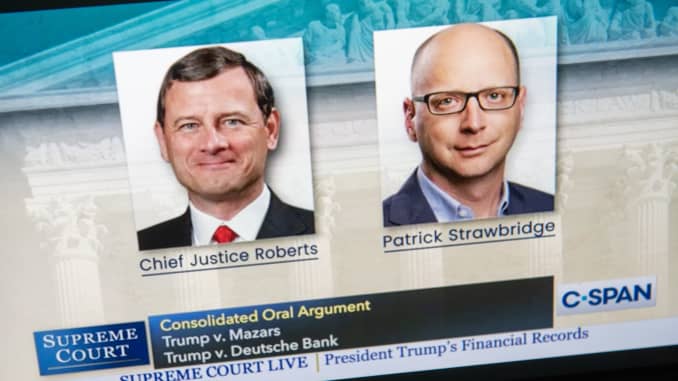- The Supreme Court appeared divided on Tuesday during arguments in a set of cases over whether President Donald Trump can keep his tax records shielded from state and congressional investigators.
- The justices considered subpoenas issued by Democratic-led congressional committees and Manhattan District Attorney Cy Vance Jr. to Trump’s banks and accounting firm for the president’s personal and business financial records.
- Attorneys for the president faced skepticism from both liberals and conservatives over whether allowing Trump to keep his tax records shielded would unconstitutionally limit the power of Congress or put the president above the law.
- Several of the court’s conservatives, though, expressed concern that a ruling against Trump could open up the presidency to a wave of burdensome investigations.

The Supreme Court appeared divided on Tuesday during arguments in a set of cases over whether President Donald Trump can shield his tax records from state and congressional investigators.
The justices considered subpoenas from Democratic-led congressional committees and Manhattan District Attorney Cy Vance Jr. to Trump’s banks and accounting firm for the president’s personal and business financial records. Lower courts in Washington and New York have upheld the subpoenas.
Attorneys for the president faced skepticism from both liberals and conservatives over whether allowing Trump to keep his tax records shielded would unconstitutionally limit the power of Congress or put the president above the law.
The president’s personal lawyer, Jay Sekulow, who argued in the Vance case, said that Trump cannot be criminally charged by a state prosecutor while in office, much less subjected to a grand jury subpoena.
“The president isn’t above the law,” Justice Elena Kagan told him.
Several of the court’s conservatives, though, expressed concern that rulings against Trump could open up the presidency to a wave of burdensome investigations and requests for documents.
Decisions are expected over the summer, in the midst of the bruising election battle between Trump and apparent Democratic nominee Joe Biden. Trump is the first major party candidate not to release his tax returns in four decades.
The nine-member court has a 5-4 conservative majority. The court’s four Democratic appointees appeared skeptical of the president’s arguments. The votes of Chief Justice John Roberts, a George W. Bush appointee, and Trump’s two appointees, Justices Neil Gorsuch and Brett Kavanaugh, could be key.
Arguments are being conducted over the phone and streamed live to the public as a result of health precautions taken to halt the spread of the coronavirus.
In the first argument of the day, over the congressional subpoenas, Roberts and Gorsuch joined the court’s four Democratic appointees in pressing Trump’s personal attorney Patrick Strawbridge and a Justice Department lawyer about their arguments for allowing Trump to keep the documents from investigators.
The cases involve subpoenas for Trump’s financial records issued by Democratic-led congressional committees to the president’s accounting firm, Mazars USA, and banks, Deutsche Bank and Capital One.
The committees have said they are pursuing investigations into potential money laundering, foreign interference in U.S. politics and whether Trump has properly disclosed his assets. Attorneys for Trump have asked the Supreme Court to reject the subpoenas on the basis that House Democrats lack a legitimate reason for investigating him.
“The committees have not even tried to show any critical legislative need for the documents these subpoenas seek,” Strawbridge told the justices in his opening statement.
But Gorsuch and Roberts pressed Strawbridge, as well as DOJ attorney Jeffrey Wall, on why the court should not defer to Congress on whether it has a valid reason for its subpoenas.
“Why should we not defer to the House’s views about its own legislative purposes?” Gorsuch pointedly asked Strawbridge at one point. “Why is this subpoena not supported by a substantial legislative need?”
Roberts skeptically asked Wall whether the court should “be probing the mental processes of the legislators.”
“Should members of House committees be subject to cross examination on why you were really seeking the documents?” Roberts asked.
Douglas Letter, an attorney for the House of Representatives, also faced skeptical questions from some of the justices over whether a loss for Trump could enable a flood of partisan investigations that could burden the presidency.
“How can we both protect the House’s interest in obtaining information it needs to legislate, but also protect the presidency?” Kavanaugh, Trump’s second appointee, asked at one point.
Letter emphasized that the subpoenas were not directed at the president, but instead to third parties.
“There’s no way that these can interfere with the president, because he doesn’t have to do anything” to respond to them, Letter said.
In its second argument of the day, the Supreme Court heard a case involving state prosecutors, rather than Congress.
Vance is investigating potential violations of state law related to hush-money payments made to two women who have alleged affairs with the president.
A federal appeals court in New York upheld the subpoenas, but Trump’s attorneys argued that he is immune from criminal investigation while in office.
“No county district attorney in the nation’s history has issued criminal process against the sitting president of the United States and for good reason,” Sekulow said. “The Constitution does not allow it.”
Roberts suggested in the case that the burden on state and local prosecutors seeking the president’s records should be higher than the one imposed on Congress.
“Shouldn’t there be a higher standard than in the separation of powers dispute?” Roberts asked.
The consolidated congressional cases are Trump v. Mazars, No. 19-715 and Trump v. Deutsche Bank, No. 19-760. The New York case is Trump v. Vance, No. 19-635.